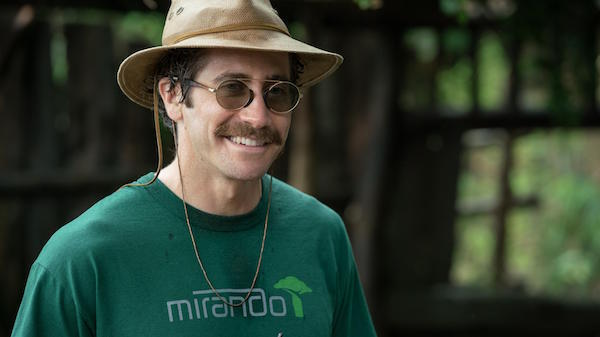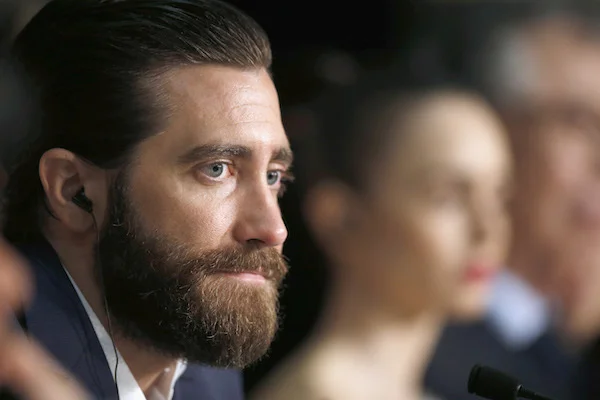As he sat down to talk to a select group about his latest film ‘Okja’ in Cannes, Jake Gyllenhaal crossed his arms in front of his chest and gave the room an intense, yet wary look-over. In that moment I thought, “uh oh” imagining the actor would be as I’d seen him before during a masterclass in Dubai — revealing exactly what he was prepared to disclose and nothing more, nothing less. Which would mean that I’d never get my answers about the man beneath the public persona. And that’s always the most interesting, isn’t it, who someone is after the spotlights are turned off and the crowds have gone home.
But Gyllenhaal, it turns out, is not only a pro at what he does — I’ll call him easily the best contemporary actor we have in the Hollywood firmament today — he is also incredibly and fascinatingly human. Once he started to relax, partly due to the praises coming his way from my fellow journalists, and partly because he began to explore ideas near and dear to his heart, I dare think because of our questions, the arms uncrossed and out came his personal truth. And framed by the full beard he was sporting in Cannes, those impossibly blue eyes and a simple short-sleeved dark green t-shirt, Gyllenhaal revealed just how spellbinding he is — both on and off the screen it turns out.
In Korean filmmaker Bong Joon Ho’s film ‘Okja’ which is slated for worldwide release on Netflix on June 28th, Gyllenhaal in the role of Dr. Johnny brings on a different game, one much more over the top than what the audience has grown to expect from the actor. Yet within that hyper grandness, his director Bong pointed to the “calm and fragile and subtle nuances of Johnny Wilcox,” the hidden genius of Gyllenhaal, which the filmmaker only managed to find in post-production while he was editing the film, and thus added, “finding those moments was really interesting to me and if you get the chance to re-watch the film, you’ll also notice those gentle moments.”
And watch ‘Okja’ again is exactly what I’m craving to do in fact. It’s a fantastic film, a fairy tale for the young and not so young, a true cinema with a conscience masterpiece. I loved the references to evil corporations — Monsanto becomes Mirando, which instead of controlling the agricultural market tries to monopolize porcine meat sales worldwide — and the fact that, be it consciously or subconsciously, I haven’t eaten meat comfortably since I watched the film at the Festival de Cannes. Actually, come to think of it, I haven’t eaten it at all! I love when a film changes my perspective, and affects different areas of my life.
But back to Gyllenhaal. While transcribing his interview, I found myself breaking down at one point, when the star talks about growing up, or rather growing to allow in the truth, after his parents’ divorce, which happened recently when he was already an adult. If I ever doubted the vulnerability of the actor, his allowing of his own authentic self in front of a roundtable of journalists, I got my answer within those recordings.
I believe it takes a true man, an exceptional human being to be that open to the world. Which is why I left Gyllenhaal’s answers below unedited, including his repeated use of “I think” when making a statement. His depth and unassuming self-respect seemed so refreshing to me, in this world of hyperboles.
Read up on Jake Gyllenhaal below and watch ‘Okja’, co-starring Tilda Swinton, Paul Dano, Lily Collins, and introducing Ahn Seo-hyun on Netflix, starting June 28th.
PHOTO BY MIKE MARSLAND/GETTY FOR NETFLIX
We often see you in serious roles but wonder, offscreen are you more of a fun person to be with, or are you also very serious in real life?
Jake Gyllenhaal: I’m very fun to be with (he says, deadpan). I think, moving forward as you spend enough time and as you have the opportunity to work as an actor, generally you care a little less about what people think and for me, you allow to present yourself as who you’d love to be or who you are. One of those things being that I just finished work on the stage in something that I love deeply and people seemed surprised that I knew how to sing, and I’ve sung my whole life. There are things like that as you get older that you just say, “fuck it, I’ve gotta do it”. So yeah, I’m fun to hang out with!
What gives you comfort in life?
Gyllenhaal: I would say the relatively obvious things, my family does. Comfort in life is a complicated, long answer. My work also gives me comfort in that when you feel like you are expressing yourself, who you really are and what you really want to do in your work, it only reflects back in your life. My friends and all the normal things give me comfort… Like a warm bath, is that what you’re asking? (giggles) I know you’re looking for specifics…
Meaning, your comfort zone in life as well. Do you try something, are you constantly challenging yourself?
Gyllenhaal: I think more and more yes, as I feel, and it’s only been recently in my work that I feel really, really fulfilled in a particular way, do I now turn towards my life. There were things that I wanted to accomplish in myself as goals, artistically, that I feel like I have. So you know, maybe in a few years ask me that question and I’ll have some better answers. More specific ones.
Your move to NYC, has it impacted your relationship with your family and your work? Is that where things started to change for you?
Gyllenhaal: I couldn’t really pinpoint where that happened but there were a number of things that happened in my life, my parents got divorced when I was 30, after many many years and I think my whole family sort of started to shift and change as things do when those things happen — when people express their truth it allows other people to do that. I think it has those reverberations.
My parents after many years made that decision and I think that changed the dynamic and truth spilled in, in a different way than it had. They went off and did things in their own lives and established the lives that maybe they had always wanted in an interesting way, which allowed, I think, me to do the same thing. It’s a wonderful argument, I think, to parenting in that way, when parents are doing what they love in particular. And also loving their children but that’s a part of it, doing what you love and it allows your children at whatever age to express that truth.
It is something that Bong’s movie says too, we are all yearning for a connection, and someone to show us how to do that and I think I would say, one of the politically — one of the issues in the world, nowadays, is how connected are we? To the environment, to other creatures around us, as Tilda [Swinton] would say, the “human animals around us”. And Bong would say that growing up is brutal, it’s a brutal process, that’s what this movie says. It’s as disturbing as it is extraordinary, but the only thing that we have is our connection with the things that we love.
And we should fight for those things as hard as we can.
Do you think it’s a good time for this film, and does it offer some kind of lesson for us?
Gyllenhaal: Lesson I don’t know. The thing I would say about this movie, is that as much as it is a movie about a child and her connection to a creature, in a lot of ways a story which we know, where you lose something you love and you go find it, the courage that Bong has for the ending of the film, what he says and what he shows us in the brutality of what the world does and showing it to a child, that’s what makes it so powerful, in my opinion.
And I think so often movies nowadays, particularly a family film, will shy away from concepts that are as dark as this. And I think it is really important for the world, and another argument for why Netflix is a really wonderful home for this movie, to get this message out wherever it can, in whatever form it can, to whoever will want to watch it, that it is a brutal world — and a beautiful one as well. That’s what makes him such an incredible filmmaker, is the courage to do that, which is why I always wanted to work with him. And why we love him so much as a filmmaker. So many other filmmakers would have left that last scene out.
Do current events make him more politicized?
Gyllenhaal: Yeah, I think. He jokes about people wanting to move to Canada, I think there is no better time to be in America, to work as hard as we can and to express ourselves, as now. I think the last thing to do is to run away and you can see that in the States particularly now, it is a galvanizing time, a time when — at least I speak for myself — I’ve been more involved in what’s happening in my country and more so in my community, my specific city and district, than ever before. And I think you’ll see that all over America, and I’m actually inspired more so than ever.
All images used with permission.

